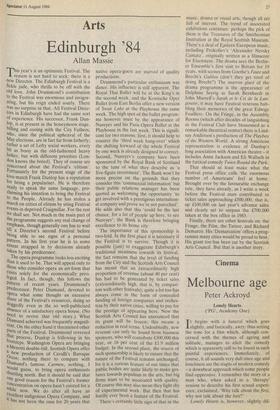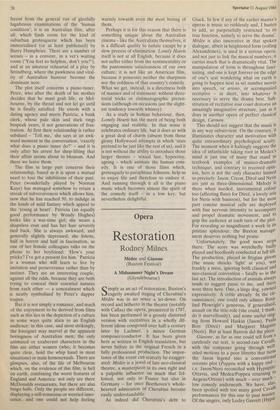Cinema
Melbourne age
Peter Ackroyd
Lonely Hearts ('PG', Academy One)
Ibegins with a funeral which goes 'slightly, and farcically, awry: thus setting the tone for a film which, although con- cerned with the themes of ageing and solitude, manages to elicit the comedy which is apparently still to be found in such painful experiences. Immediately, of course, it all sounds very dull since age and loneliness are the staple of modern comedy — a downbeat approach which some people find oppressive. I remember the story of a man who, when asked in a 'therapy' session to describe his first sexual experi- ence, exclaimed, 'Why talk about the first, why not talk about the best?'
Lonely Hearts is, however, slightly dif- ferent from the general run of gleefully lugubrious examinations of the 'human condition'; it is an Australian film, after all, which finds room for the kind of suburban grotesquerie which has been immortalised (or at least publicised) by Barry Humphries. There are a number of scenes - in a convent, in a vet's waiting room (`You feel so helpless, don't you?'), and at an amateur rehearsal of a play by Strindberg, where the pawkiness and vital- ity of Australian humour become the dominant note.
The plot itself concerns a piano-tuner, Peter, who after the death of his mother decides that he must grab life, or Mel- bourne, by the throat and not let go until he is finally satisfied. He enrols with a dating agency and meets Patricia, a bank clerk, whose pale skin and dark rings bespeak years, if not generations of frus- tration. At first their relationship is rather subdued - 'Tell me,' she says at an awk- ward moment in the conversation, 'exactly what does a piano tuner do?' - and it is only after his arrest for shop-lifting that their affair seems about to blossom. And there we leave them.
The film in large part concerns their relationship, based as it is upon a mutual need to lose the inhibitions of their past. Peter (wonderfully played by Norman Kaye) has managed somehow to retain a streak of subversiveness which allows him, now that he has reached 50, to indulge in the kinds of mild fantasy which appeal to the 'young at heart'. Patricia (an equally good performance by Wendy Hughes) looks like a war-time girl; she wears a shapeless coat and has her hair severely tied back. She is always awkward, and generally slightly depressed; she listens, half in horror and half in fascination, as one of her female colleagues talks on the phone to her boyfriend: 'How's your pricky? I've got a present for him.' Patricia is a woman who will learn to live by imitation and perseverance rather than by instinct. They are an interesting couple, against all the odds, because they are both trying to conceal their essential natures from each other — a concealment which is neatly symbolised by Peter's dapper toupee.
But it is not simply a romance, and much of the enjoyment to be derived from films such as this lies in the depiction of a culture in some ways quite alien to an English audience: in this case, and most strikingly, the foreigner may marvel at the apparent boringness of Australian men; the only animated or exuberant characters in the film are either women (who, it becomes quite clear, hold the whip hand in most situations) or male homosexuals. There are glimpses, also, of the life of Melbourne which, on the evidence of this film, is hell on earth, combining the worst features of England and America: not only are there McDonalds restaurants, but there are also bingo halls. Only the people are different, displaying a self-conscious or worried inno- cence, and one could not help feeling warmly towards even the most boring of them.
Perhaps it is for this reason that there is something unique about the Australian cinema - like the Australians themselves, it is a difficult quality to isolate except by a slow process of elimination. Lonely Hearts itself is not at all English, because it does not suffer either from the sentimentality or the pantomimic salaciousness of our own culture; it is not like an American film, because it possesses neither the sharpness nor the coldness of that country's comedy. What we get, instead, is a directness both of manner and of statement: without direc- torial tricks or cinematographic preten- sions (although on occasions just the slight- est tendency towards whimsy).
As a study in human behaviour, then, Lonely Hearts has the merit of being both engaging and realistic. In that sense it celebrates ordinary life, but it does so with a great deal of charm (absent from those glossy Hollywood attempts in which 'stars pretend to be just like the rest of us), and it is not without the ability to introduce those larger themes - sexual lust, hypocrisy, ageing - which animate the human com- edy. It is one of those films which, grotesquely to paraphrase Johnson, help us to enjoy life and therefore to endure it. And running through it all is the piano music which becomes almost the spirit of the comedy itself - in a low key, but nevertheless delightful.







































 Previous page
Previous page